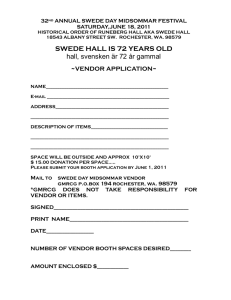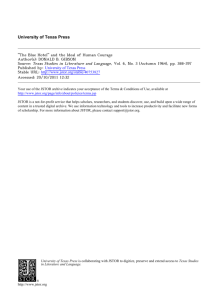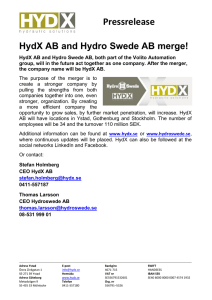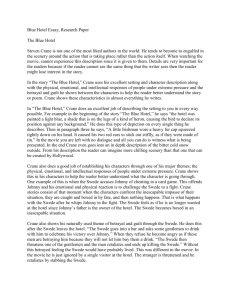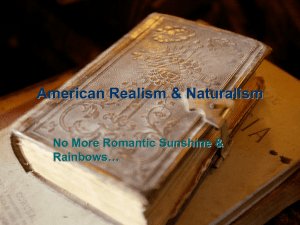UNIT 6 STEPHEN CRANE (1871-1900) THE OPEN BOAT & THE
advertisement
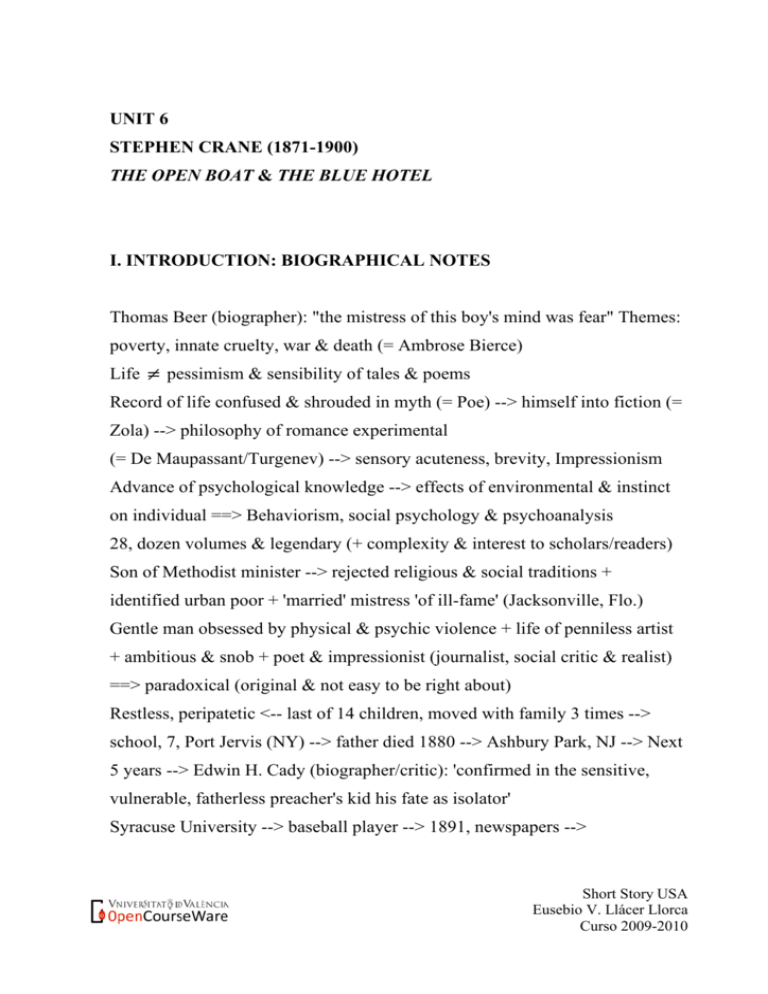
UNIT 6 STEPHEN CRANE (1871-1900) THE OPEN BOAT & THE BLUE HOTEL I. INTRODUCTION: BIOGRAPHICAL NOTES Thomas Beer (biographer): "the mistress of this boy's mind was fear" Themes: poverty, innate cruelty, war & death (= Ambrose Bierce) Life ≠ pessimism & sensibility of tales & poems Record of life confused & shrouded in myth (= Poe) --> himself into fiction (= Zola) --> philosophy of romance experimental (= De Maupassant/Turgenev) --> sensory acuteness, brevity, Impressionism Advance of psychological knowledge --> effects of environmental & instinct on individual ==> Behaviorism, social psychology & psychoanalysis 28, dozen volumes & legendary (+ complexity & interest to scholars/readers) Son of Methodist minister --> rejected religious & social traditions + identified urban poor + 'married' mistress 'of ill-fame' (Jacksonville, Flo.) Gentle man obsessed by physical & psychic violence + life of penniless artist + ambitious & snob + poet & impressionist (journalist, social critic & realist) ==> paradoxical (original & not easy to be right about) Restless, peripatetic <-- last of 14 children, moved with family 3 times --> school, 7, Port Jervis (NY) --> father died 1880 --> Ashbury Park, NJ --> Next 5 years --> Edwin H. Cady (biographer/critic): 'confirmed in the sensitive, vulnerable, fatherless preacher's kid his fate as isolator' Syracuse University --> baseball player --> 1891, newspapers --> Short Story USA Eusebio V. Llácer Llorca Curso 2009-2010 2 (artist friends & brother Edmund's, Lake View, NJ --> extreme privation) ==> observer of psychological & social reality (realistic credo of Hamlin Garland) --> rejected by NY editors --> 1893 (own expense), Maggie, A Girl of the Streets (literary naturalism in America) <--> mass audience Syndicate that took Red Badge (fortune improve) --> 1895, reporter to American West & Mexico ==> "The Bride Comes to Yellow Sky" & "The Blue Hotel" --> Then Black Riders and Other Lines, first poetry The Red Badge of Courage (fall) --> realistic in modern way (intnal acclaim) Religious, social & literary rebelliousness --> direct action (NY police) 189697, cover insurrection against Spain in Cuba (Cora Howorth Taylor, Hotel de Dream in Jacksonville, Florida) --> 3 last years of his life The Commodore sank off coast of Florida ==> "The Open Boat" (physical/emotional/intellectual responses under extreme pressure + nature's indifference to humanity's fate --> need for compassionate collective action) 1897, cover Greco-Turkish War + England (Joseph Conrad, H.G. Wells + Ford Maddox Hueffer & Henry James + Harold Frederic) 1898, Spanish-American War (Joseph Pulitzer's New York World) Last months, desperate situation = tuberculosis + in debt (write for money) --> 1899, 13 stories (Whilomville for Harper's Magazine) + 2nd poetry, War Is Kind + weak novel Active Service + The Monster and Other Stories --> 9 articles (great battles) + 25 chap. novel The O'Ruddy --> (assistance of Henry James) dies, Badenweiler, Germany, June 5, 1900 II. CHRISTIAN (PAGAN) VISION OF THE WORLD? Skepticism of generation (young for Civil War + America's power) Short Story USA Eusebio V. Llácer Llorca Curso 2009-2010 3 "God is dead" --> 1890s, prose & poetry of Stephen Crane World = violent cosmic unrelated to longings/ideas/beliefs (human = victims) Smart-alecky, "fresh", cocky --> more mature than Hemingway (stoicism) Style never an end --> deliberate & highly colored ==> provocative way Sensibility = aggressive, stoic, humorous, not frivolous = power of literature = concentrate, condense, reduce into shape certain intractable images Turned in one direction & never willing to look in another "War is life and life is war" --> pressure of others ==> "Art is a child of pain" -> artist describe situation on the "slant" (narrow, crooked, field) --> The Red Badge of Courage, 1st American impressionistic novel (popular) --> appeal to popular audience & money ("pot-boiler" = no quality) --> education of young man in context of struggle (dominant story-type) Distinctively modern = identity complex/ambiguous + readers to judge III. CRANE'S LITERARY DEVELOPMENT: REALISM, NATURALISM & IMPRESSIONISM Personification + zeugma (elípsis) as figure --> classical tendencies Daniel G. Hoffman: "Crane was a literary chameleon" Naturalist only historically (Maggie, 1893) <--> minor undeniable role No naturalistic (Red Badge of Courage) <--> Bowery tales: "The Men in the Storm"/"An Experiment in Misery") --> + epistemological / - determinism ==> Free will more important than chance/fate + irony discordant with Naturalism (<-- false estimate of self leads to climactic diminution) Nat. = epic in length & focus + omniscient narrator + symbolization + sincerity + common characters -> elevation & broad social significance ==> Short Story USA Eusebio V. Llácer Llorca Curso 2009-2010 4 "truth" <===> Crane = episodic units (brevity) + restricted narrative + sensory images & imagistic correlatives (<-- characters' minds) ==> psychological state -> ironical reduction & specificity (individual + isolation) Realism & Impressionism = similar characters + common folk (middleAmerica) + objective narrative methods -- > Realistic more access to information (biographical) directly or through dramatic method Impressionism = no resolution of ethical issues (no complete circumstances) Realism = reality known & recorded = stable, certain, comprehensible (what to do) <--> Impressionism = not certain = rapid flux (define & understand) - stories use moral crisis as climactic moment --> + growth of character Little distinction structural units of short stories & novels (episodes strung together by character/place, not action) + not Jamesean psychological realist Compelling of mental lives is normality --> psychological "realism" = epistem. record of sensory experience (-> internalization, reflection, fantasy) Dramat. psychological realism in Red Badge = naturalistic view of heroism --> hero discover manhood by violent action --> reportorial art maturity ("The Blue Hotel" & "The Open Boat" --> effect by understatement) Balance between reality-imagination = great art + instinct-circumstance --> individual-tragic issue --> next generation (Hemingway, Steinbeck) Even journalism --> + psychological process -- descriptive detail Realism = Crane ==> Rejection of Romanticism (stylistic elevation + transcendental metaphysics & pantheism + symbolization + allegorical plots & characters + people/events as emblematic) --> ordinary people Unlike realists (things "are") ==> unstable, changing world (things "seem") Sullivan County tales = dramatic irony --> central character = limited view <-> reader's perspective = systematically enlarged ==> Resolution = epiphany reveals absurd role in situation (Orm Øverland) Short Story USA Eusebio V. Llácer Llorca Curso 2009-2010 5 Tone = apprehension born of isolation & uncertainty The Red Badge of Courage = 1st impressionistic novel in Am lit Epistemology (psychological conflict -> resolution = thought/feeling) Sensory emphasis = + visual -- verbal experience The Third Violet & Active Service (<-- popularity of Genteel novels) The O'Ruddy -> picaresque (Ireland-Frederic's The Return of the O'Mahony) Crane's world (unsettled, tentative, inscrutable for his time) + characters (uncertainty, anguish & isolation) = Modern sensibility (Hemingway) --> no background, no sympathy by narrator, no moral opinion, no conclusions Impressionistic style (Hamlin Garland, Henry James, Harold Frederic, Bierce, Kate Chopin & English Ford Maddox Ford and Joseph Conrad) In essence no Realist --> symbolic artist (extends Realism) + Irony = chief technical instrument ==> paradox of man, his plight (Flaubertian style) Work = sparse, crisp, sensory + no authorial presence + little description & judgment + few wasted words ==> aesthetic impact + no call to social action + no program of economic reform + rarely popular social theory + brevity /sharpness (Hemingway, Sherwood Anderson, F. Scott Fitzgerald, Caroline Gordon & parts of John Steinbeck, William Faulkner, John Dos Passos...) Impressionist relativistic realities ==> Modernism (indifferent & undefinable universe + lack of individual significance) => Expressionism (evocative & surrealistic imagery) ==> Existential alienation (despair & anguish) ==> Absurdity of French New Novel & Post-Modernism (interpretive uncertainties) ==> US Sur-Fiction (anti-didacticism & art-for-art's sake) Enthusiastic interest emerged in 1920s (life & work in modern scholarship) ==> continuing value of his contribution --> literary Impressionism Short Story USA Eusebio V. Llácer Llorca Curso 2009-2010 6 IV. THE OPEN BOAT (1897) Finest short story & masterwork of XIX cent. American literature "A Tale Intended to Be after the Fact. Being the Experience of Four Men from the Sunk Steamer Commodore" = fictional reworking (Atlantic-Flo.) To be accurate & interpretation with broad social/metaphysical significance Scribner's Magazine (collected in Am & Eng eds of The Open Boat) Ironic narrative juxtaposition --> preoccu of 4 men vs. detached perspective Opening line = severely restricted view <--> omniscient narrator (objective) Limitations more acute <--> juxtaposed: detached observation of narrator Moments of great intensity vary in significance --> accord to perspective ==> reader to consider plight of men (abstract view & situation in the boat) --> reconcile intrusive passages (omniscient) & restrictive Impressionism Men relative strangers --> unexpected community ("brotherhood") Microcosm of dinghy = society collaborative --> insignificance of individual Detachment of narrator not Crane's (author = experienced events himself) "Objective" pole of impressionistic narration = pure sensation & "subjective" extreme = mental activity (<-- sensory data) --> stream of consciousness? Prior stream of consciousness & Express --> occasional subjective distortion Chorus technique = pertains to underlying themes (death) Refrain = generalized thinking of 4 men in boat <--> cosmic indifference Narrator's projection of thoughts as mental flow --> 1st refrain (= danger + protest against unjust Fate + absurdity + egotistical rage) 2nd refrain (abbrev) = 3rd = correspondent = Carol Norton sentimental hero 4th section (midpoint) = no help from people on shore Short Story USA Eusebio V. Llácer Llorca Curso 2009-2010 7 Refrain mode = stream-of-consciousness narration & intrusive narrative projections --> thought of narrator to interpret action + thinking of men cosmological presumptive with malevolence of agents in universe 1st refrain = assessment of danger --> 2nd = man on shore dont't help --> 3rd = night correspondent sees a shark 6th section --> no collective consciousness --> correspondent's mind ==> theme: action & danger --> epistemology & nature: hostile to indifferent Correspondent's mind: distant star (protest to nature indifference) & tower on beach (reality/man's perception) = impressionistic themes Chorus-refrain = narrator's projection of interpretation of events + quasi Romantic statement by nature + stream-of-consciousness of precognitive thought + generalized statement of what characters "must" be thinking ==> restrict sources of information (limitation & erroneous interpretations) Oiler (only competent sailor) drowns --> no Darwinian doctrine of survival of the fittest & efficacy of brotherhood --> each man must swim to shore alone -> death of oiler = indifference of nature & isolation of man Thematic development = growth of perception --> increased understanding of perceptual realities & problematic nature of interpretation Illusion of sensory reality being apprehended by a character (<-- brief units of sensation --> structure of episodes unified by theme & character) Speech of men abrupt & disjointed sentences ==> confused motion & change Episode = sensorial description --> dialogue & description of action In process: narrative perspective = mind of single character --> awareness of fictional world of character & restriction to third-person identification with mind of character --> human beings comprehend only partial truths & delude themselves about knowledge & distortion & data reconstruction Short Story USA Eusebio V. Llácer Llorca Curso 2009-2010 8 Reader's mind = first exposed to narrator --> identified with character ==> emphasis on psychological reality + human receptor of sensory experience World = ephemeral, evanescent, shifting & defying precise definition Narrative restriction + limited sensory data + distorted interpretations of info. + modulations among differing p.o.v. = methods of presentation ==> narrative strategies related to episodic plots, sensory imagery & epistemological themes (involving perception & realization) "The Open Boat" = impressionistic Realism (Maggie) + symbolic Realism (Red Badge) ==> foremost engineer of techniques of modern fiction V. THE BLUE HOTEL (1898) Best Western story + Collier's Weekly (The Monster and Other Stories) Extreme, improbable circumstances (Fort Romper, Nebraska) + Patrick Scully & Son (Johnnie) + Swede + Cowboy (Bill) + Easterner (Mr. Blanc) Swede: paranoid fear (fictional representation of West) --> card game (Johnnie cheats?) --> Scully-Swede --> card game --> Swede <-> Johnnie --> Swede to saloon (bartender + 2 businessmen + district attorney) --> Swede <--> gambler (into drinking) = Swede's death --> judgement Saloon = resort of convivial humanity -> Legend on top of cash-machine Swede = Wild West + disturbed mental state + actions to death (isolation) 9th section = different moral view ==> failure of community Cowboy in Dakota line + Easterner (3-year sentence) --> cowboy (<--> Swede's accusation of Johnnie) + Easterner (Johnnie was cheating) + conspiracy of silence --> Swede's death Short Story USA Eusebio V. Llácer Llorca Curso 2009-2010 9 Antithetical interpretations = Howellsian doctrine of complicity or existential necessity for human brotherhood + naturalistic outlook (no man's control) + logical gap (Swede's responsibility & Easterner's on group culpability) Hyperbolic Easterner's speech --> burlesque literary naturalism (complicity) One man can terrorize a group = unexpected character of Swede (humor) Swede's effect = funny, hysteria-making --> not understood/believed Scully = caricature of business dealing with...Hitler (Swede = buffoon) Clumsiness of men fighting in snow & others to take Swede down (normalize) Every sin is a collaboration (character in alien environment & desire to cooperate) ==> existentialist quality = Swede aims at own destruction (fate) Demonstration = exposure of secret pattern + logic of life itself ==> crazy startling humor of savage denouement --> unexpected = factor to the end (not "moral" of story but weirdness of situation remains with readers) Swede = villain + victim + ominous fortune-teller in us Drama in two card games --> beauty of Crane's story = mood (literary images + description of characters + whole feeling of place) Zany (strange) = bridge to horrible + horror = threat hanging over us Great story (<-- recognize ourselves in it without knowing why) Political content = universal & timeless + Strong irony (West myths/legends) Contradict endings ==> modernistic awareness of multiplicity & partiality of individual perceptions & futility of coherence on chaos of existence Short Story USA Eusebio V. Llácer Llorca Curso 2009-2010
